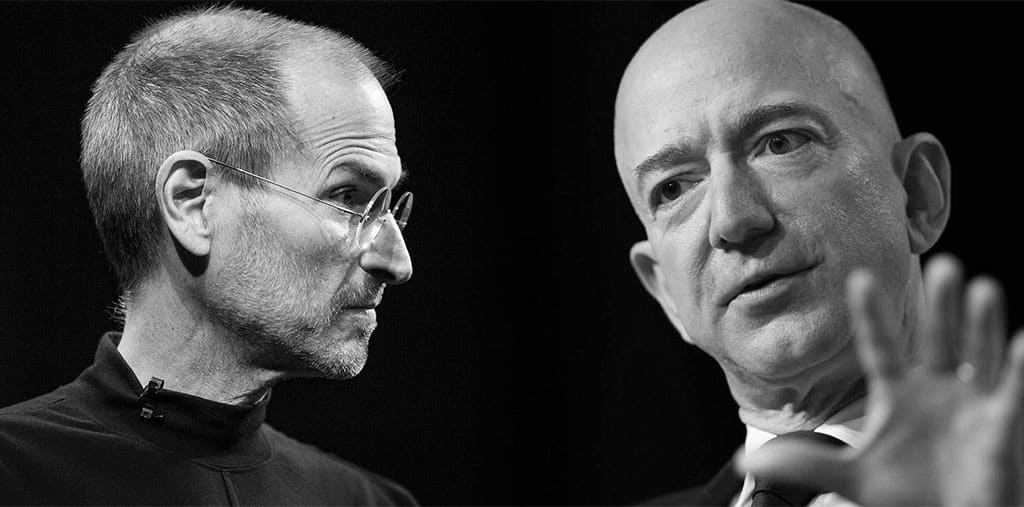What Do Steve Jobs, Jeff Bezos, and Oprah Winfrey Have in Common? A Little Help from George Washington

Steve Jobs, who put the iPhone in the pockets of millions of Americans, owed more to George Washington than he could have ever imagined. So do Amazon’s Jeff Bezos, Multimedia Maven Oprah Winfrey, Mattel’s Ruth Handler, and countless other enterprising Americans who have been among the 1%. The American culture of entrepreneurship and famously strong economy that encouraged and nurtured their successes did not sprout into being by sheer happenstance. It was our first President who painstakingly laid the foundation for the entrepreneurial culture to take root in America.
What most of us remember about George Washington’s legacy from history class probably has mostly to do with the Revolutionary War or his unassailable character—not his role in creating the foundation of a flourishing U.S. economy. In fact, many writers and historians assume that Washington knew little or nothing about economics, and attribute the early successes in the field to Alexander Hamilton. As Washington’s Treasury Secretary, Hamilton performed brilliantly in refinancing the nation’s debt structure and creating a national bank. President Washington’s economic blueprint for the country, however, was far broader in scope and we, Americans of 2019, owe quite a lot to his strategic vision for the United States.
Stifled by British imperial policies while growing up, George Washington developed a vision of an economic model for the fledgling United States that was based on his own professional experiences. In his private life he was a serial entrepreneur and dealmaker long before those terms were even invented. He drew from those experiences upon becoming President to create laws, policies, and practices designed to create a flourishing entrepreneurial society. To achieve it, he had to overcome serious opposition from many quarters, including from within his own administration. In addition, he also had to deal with the substantial obstacles placed in his path by foreign adversaries. He persevered because he was keenly aware of the unfairness of the British system and understood why and how it had to be changed.
Washington, however, never formally laid out his economic philosophy in the colonial equivalent of a white paper, as the last thing on his mind was to consciously devise a new economic theory. That kind of thinking, then and now, has generally been the province of academicians. Washington’s approach was pragmatic, based on his experience working under British colonial rule and seeing very clearly what did not work. He knew that eliminating corruption, dismantling the roadblocks to business formation, fostering a stable national culture, establishing a respected federal judiciary, promoting the availability of private credit, and other similar measures had to happen in order to create a flourishing economy.
During Washington’s tenure in office the American society in fact achieved a remarkable transformation, as evidenced by the creation of new commercial enterprises, the general prosperity in cities and towns, the active trade of the United States, and the growing demand for U.S. government debt. The system worked so well that, even with the built-in delays for such a program to mature and bear fruit, the nominal GDP of the United States during the last decade of the 18th century soared by an average of 9.78% per year, enabling the country to catch up with mighty Great Britain in output per capita only 20 years later.
Washington’s actions are even more striking when you consider how far the country has come since then. Today the U.S. economy accounts for the lion’s share of global output and provides the basis for our unmatched standard of living at home. The dollar is the preeminent currency for trade and finance in the world, and investors flock to the U.S. from other lands to pursue interest in our markets. Aside from the resilience and strength of the American economy, its propensity to produce life-changing innovations and technological breakthroughs is an inspiration to others.
Whether or not you’re in the 1% of wealth in this country, we all owe a debt to our first President’s socio-economic vision, which was far more comprehensive in its dimension than is often credited. His extraordinary ingenuity and his unyielding determination in seeing his vision take root are directly responsible for the foundations that have allowed our economy to flourish. George Washington is, therefore, not only the father of our country, he is also the architect of our very special and highly successful economic paradigm.
Have you read?
# World’s Best Countries To Invest In Or Do Business.
# Most Expensive Countries In The World To Live In, 2019.
# Global Passport Ranking, 2019.
# The World’s Safest Cities Ranking.
# Most Startup Friendly Countries In The World.
Bring the best of the CEOWORLD magazine's global journalism to audiences in the United States and around the world. - Add CEOWORLD magazine to your Google News feed.
Follow CEOWORLD magazine headlines on: Google News, LinkedIn, Twitter, and Facebook.
Copyright 2025 The CEOWORLD magazine. All rights reserved. This material (and any extract from it) must not be copied, redistributed or placed on any website, without CEOWORLD magazine' prior written consent. For media queries, please contact: info@ceoworld.biz








